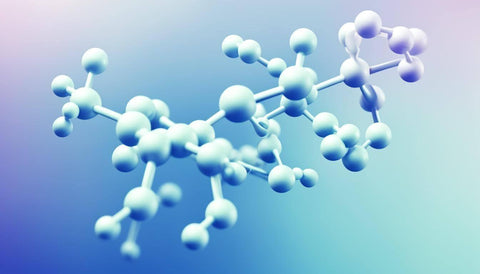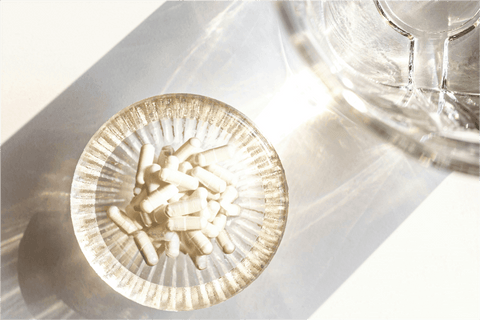What Is Spermidine? Benefits, Food Sources, and Side Effects

Spermidine is a type of polyamine compound that our cells use for many important jobs. It helps our cells grow, change, and survive, which keeps us healthy. Scientists are excited because recent studies have found that spermidine might help with living longer, improving how our cells clean themselves (autophagy), and protecting our brains.
We're going to learn more about where we can get spermidine from, its possible health perks, and the newest research on taking it as a supplement. Come with us as we uncover the wonders of this compound. Let's see how it can help us live our best, healthiest lives.
Key Takeaways:
- Spermidine is a naturally occurring polyamine compound found in all living cells.
- It plays a crucial role in cell growth, differentiation, and survival.
- Recent studies suggest spermidine may have potential health benefits, particularly in the areas of longevity, autophagy, and neuroprotection.
- Dietary sources of spermidine include plant-based foods like wheat germ, soybeans, and lentils, as well as aged cheeses and fermented foods.
- Research on spermidine supplementation is ongoing to explore its therapeutic potential and potential applications in the prevention and treatment of age-related diseases.
Overview of Spermidine
Spermidine is a vital part of our body's functions. It belongs to polyamines, key for how cells work. These compounds are everywhere in the living world and help in many ways.
Understanding Polyamines
Polyamines are special because they have more than one positive charge. They include putrescine, spermidine, and spermine. These compounds are crucial for cell growth and keeping the cell alive. Among them, spermidine has unique functions in the body.
Spermidine's Role in the Body
Spermidine impacts how our genes, proteins, and cells communicate. It supports the growth and life of cells. Also, it plays a big part in managing 'autophagy' and 'apoptosis', which are key for cell health.

Studies show that spermidine is good for health. Adding it to the diet may help live longer and stay healthier. The enzyme involved in making spermidine, called spermidine synthase, is also a hot topic.
You can find spermidine in many foods. Things like wheat germ, soybeans, and lentils are packed with it. Organs meats and aged cheeses, along with certain veggies and fruits, are good sources too.
What is Spermidine?
Spermidine is a key compound in our bodies' biological processes. It is a polyamine that helps cells work. You can find this compound in every living thing.
Chemical Structure and Properties
Spermidine has a unique makeup. It has four amino groups and a ten-carbon chain. This gives it the ability to work with cell parts. It's positive, which means it can attach to things like DNA and proteins.
Biosynthesis and Metabolism
Spermidine is made in a complex way in our bodies. It comes from arginine, an amino acid, and changes into other forms as needed. This process is tightly controlled to keep cells healthy.

Spermidine helps with autophagy, a way of clearing out cell waste. This makes it potentially helpful in fighting age-related diseases. It may also lower inflammation and aid in cell growth and differentiation.
Many foods, like wheat germ and cheeses, have spermidine. But, some people take extra doses for possible better health. Studies are looking at how safe and helpful this is, aiming for knowledge in areas like living longer and better brain function.
Dietary Sources of Spermidine
Spermidine can be found in many foods we eat every day. This includes both plant-based and animal-based foods. By eating a mix of these, we can add more spermidine to our diets.
Plant-Based Foods Rich in Spermidine
Plants like wheat germ and soybeans are great sources of spermidine. Also, lentils, peas, and some fruits like oranges are full of it. Adding these to your meals can boost your spermidine levels.
Animal-Based Foods Containing Spermidine
Animal foods like aged cheeses and organ meats have spermidine too. Fermented items like sauerkraut add to this list. With a variety of foods, we get more spermidine in our diets.

Potential Health Benefits of Spermidine
Spermidine is a type of polyamine found in our bodies. It's getting a lot of interest for its possible health and long life effects. This natural compound might help with anti-aging, starting a cleaning process in cells (autophagy), and protecting the brain.
Anti-Aging Properties
What makes spermidine exciting is its role in slowing down aging. Studies show it can start a process called autophagy. Autophagy helps the body get rid of old and bad parts.
By doing this, spermidine could stop the build-up of harmful stuff in cells. This might make cells work better and even help living longer.
Autophagy Induction
Autophagy is about cells cleaning up and reusing their own parts. It's really important for health and a long life. Spermidine is great at starting autophagy, which is good news for fighting diseases that come with aging.
It can also get rid of bad cell parts and proteins. This might keep cells healthier and reduce the chance of age-related problems.

Neuroprotective Effects
Recent findings suggest spermidine might help protect the brain and nerves. Some studies hint it could lower the risk of brain diseases like Alzheimer's and Parkinson's. The exact ways spermidine does this are still being looked into.
But, it seems to help with autophagy and fight off harmful cell stress. These actions might be why it's good for the brain.
Our bodies make less spermidine as we get older. Some scientists think taking spermidine as a supplement might help. Early studies with animals look positive. But, more study is needed to know for sure if it's safe and works in people.
We're still learning about spermidine. But, it's clear it could be big for health and living longer. Many in the science world are excited to see where this goes.
Spermidine Supplementation and Research
Spermidine is naturally found in many foods. The benefits of taking spermidine by mouth are being studied. It is believed to help with living longer, thinking better, and having a healthier heart.
Research is looking into how spermidine works. They are learning how it teams up with other natural chemicals to improve health.
Therapeutic Potential
Many studies look at what happens when people take spermidine by mouth. Some say it can slow down the natural decrease of spermidine levels. This might help with aging and diseases that come with getting older.
It can also start a process called autophagy. This helps cells get rid of things that aren't working right anymore.
Safety and Tolerability
Interest in taking spermidine is increasing. People want to know if it's safe. So far, manufactured spermidine is seen as safe. Yet, talking to a doctor before taking it, especially if you take other medicine or vitamins, is a good idea.
Ongoing Studies
Scientists are still learning about spermidine's health perks. They are looking into how it works and if it can treat some diseases of aging. They are also figuring out the best amount and form of spermidine for different people and health issues.
| Study | Focus | Findings |
|---|---|---|
| Longevity Study | Effects of spermidine on lifespan | Spermidine supplementation increased lifespan in animal models |
| Cardiovascular Study | Impact on heart health | Spermidine improved cardiovascular function and reduced inflammation |
| Neurological Study | Neuroprotective effects | Spermidine exhibited potential in preventing neurodegeneration |
Considerations and Future Directions
Spermidine research is growing rapidly. We need to look at how it's absorbed and whether it can enter the brain. This is important for its health benefits, especially for the brain.
Bioavailability and Absorption
Spermidine comes from foods, but not all foods give it to us the same way. We know the gut can take it in, but its journey to the brain is not fully understood. Figuring out how it gets to the brain is key for brain health research.
Potential Interactions and Contraindications
Before taking spermidine, we should look at how it might mix with other things we take or any health issues. Even though it's natural, it could affect drugs or other supplements. Researchers are working on this to make smart choices about using spermidine.
Personalized Spermidine Supplementation
As we get more info on spermidine, we might start using it in ways that fit each person. Age, what we eat, and how our bodies work can change what's best for us. This might make it more effective and safer for everyone.
Adding spermidine from the outside could do some good things, studies say. It might help us deal with stress better and fight inflammation. But, we still need to know exactly how it all works and what it does in our body.
Conclusion
In conclusion, spermidine is a crucial compound that plays a significant role in cellular health, longevity, and overall well-being. By understanding its benefits and incorporating spermidine-rich foods into your diet, you can take proactive steps towards a healthier life. Curious to learn more about how spermidine can enhance your health? Subscribe to the Just-Glow newsletter for the latest updates and tips on maximizing your well-being!
FAQ
What are the dietary sources of spermidine?
You can find spermidine in many foods, especially in plants. Foods like wheat germ, soybeans, lentils, and even peas have it. Certain fruits and veggies also contain spermidine. Animal products, like aged cheeses, and certain meats, especially organ meats, are good sources too.
What does spermidine do for your body?
Spermidine promotes cellular renewal and autophagy, which can improve overall health, enhance brain function, and support cardiovascular health. It may also contribute to longevity and reduce inflammation.
What is the purpose of spermidine?
The primary purpose of spermidine is to stimulate autophagy, a cellular process that removes damaged cells and regenerates healthier ones, thereby promoting cellular health and longevity.
What is the richest source of spermidine?
The richest dietary sources of spermidine include wheat germ, soybeans, mushrooms, and aged cheeses. These foods provide high levels of spermidine to support your health.
Are there downsides to spermidine?
Potential downsides of spermidine include gastrointestinal discomfort in some individuals. Always consult with a healthcare provider before starting any new supplement to ensure it is safe for you.
Summary
Have you ever wondered about living longer and healthier? Spermidine is a key player in this game. It's a naturally occurring compound that is gaining a lot of attention for its potential impact on aging and wellness. But what exactly is it, and why should you know about it?






